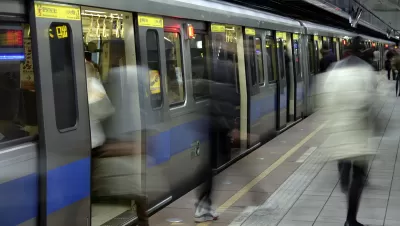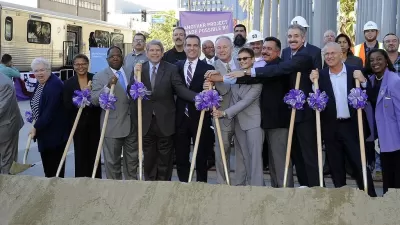Ridership declines mean falling revenues for transit agencies, and could be the beginning of a cycle of service cuts and fare increases leading to yet more ridership declines.

Around the United States, transit ridership is falling. Disappearing bus riders in particular have driven big drops in Miami, Philadelphia, Los Angeles and 31 of 35 large American metro areas. "Researchers concluded factors such as lower fuel costs, increased teleworking, higher car ownership and the rise of alternatives such as Uber and Lyft are pulling people off trains and buses at record levels," Faiz Siddiqui reports for The Washington Post.
The issue isn't merely that ridership is down around the country, but that this drop in ridership may lead to a vicious cycle. "The problem: The declines mean a decrease in farebox recovery, which can often lead to fare increases and reduced service, as in Metro’s case," Siddiqui writes.
"Exceptions to the trend: Seattle, Phoenix and Houston, which either expanded transit coverage and boosted service or underwent ambitious network overhauls, as in Houston’s case," Siddiqui reports. While improving services by reorganizing them or investing in expansions boosted their ridership, it didn't eliminate all the problems associated with cars. "[Seattle], which has some of the worst traffic congestion in the country, hosts about 45,000 Amazon employees and had added 60,000 workers to its center city core since 2010, according to Andrew Glass-Hastings, Director of Transit and Mobility for the Seattle Department of Transportation."
FULL STORY: Falling transit ridership poses an ‘emergency’ for cities, experts fear

Planetizen Federal Action Tracker
A weekly monitor of how Trump’s orders and actions are impacting planners and planning in America.

Congressman Proposes Bill to Rename DC Metro “Trump Train”
The Make Autorail Great Again Act would withhold federal funding to the system until the Washington Metropolitan Area Transit Authority (WMATA), rebrands as the Washington Metropolitan Authority for Greater Access (WMAGA).

DARTSpace Platform Streamlines Dallas TOD Application Process
The Dallas transit agency hopes a shorter permitting timeline will boost transit-oriented development around rail stations.

Parks: Essential Community Infrastructure — and a Smart Investment
Even during times of budget constraint, continued investment in parks is critical, as they provide proven benefits to public health, safety, climate resilience, and community well-being — particularly for under-resourced communities.

Porches, Pets, and the People We Grow Old With
Neighborhood connections and animal companions matter to aging with dignity, and how we build can support them. Here’s a human-scale proposal for aging in place.

Single-Stair Design Contest Envisions Human-Scale Buildings
Single-stair building construction is having a resurgence in the United States, where, for the last several decades, zoning codes have required more than one staircase in multi-story housing developments.
Urban Design for Planners 1: Software Tools
This six-course series explores essential urban design concepts using open source software and equips planners with the tools they need to participate fully in the urban design process.
Planning for Universal Design
Learn the tools for implementing Universal Design in planning regulations.
City of Charlotte
Municipality of Princeton
City of Camden Redevelopment Agency
City of Astoria
Transportation Research & Education Center (TREC) at Portland State University
US High Speed Rail Association
City of Camden Redevelopment Agency
Municipality of Princeton (NJ)



























